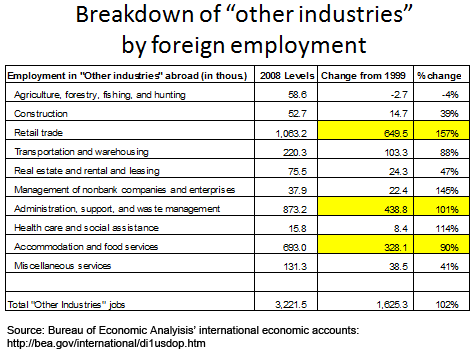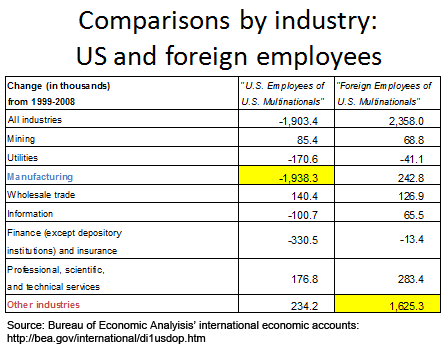 Unless we, as a Country, decide to “go Luddite.” Contrary to claims by Unions and other pro-labor groups, “offshoring” is not the obvious and primary cause of job loss in the U.S; productivity improvements and shifting business dynamics are (among other things). This chart, from the Atlanta Fed proves the Unions/labor wrong, rather conclusively:
Unless we, as a Country, decide to “go Luddite.” Contrary to claims by Unions and other pro-labor groups, “offshoring” is not the obvious and primary cause of job loss in the U.S; productivity improvements and shifting business dynamics are (among other things). This chart, from the Atlanta Fed proves the Unions/labor wrong, rather conclusively:
In the 10-year period from 1998-2008, we saw 1.9 million manufacturing job “losses” domestically, while only 242,800 such jobs were “created” abroad by U.S. multinational firms (i.e. this ignores multinational firms based in other countries). Many groups – and let’s be honest, all of us at one point or another – have blamed services companies for off-shoring the majority of their customer service and administrative/operations, but again, the above chart shows this is largely a myth. Of 335,000 jobs “lost” in financial institutions (many of them operations/administration/service jobs), only 13,400 were “created” in other countries.
Some skeptics may look at the “Other Industries” line and question why only 234,200 jobs were “created” in the U.S. while over 1.6 million were “created” abroad. Unfortunately for such skeptics, this is easily explained (emphasis mine):
Sixty-nine percent of the foreign employment growth by U.S. multinationals from 1999 to 2008 was in the “other industries” category, and 87 percent of that growth was in three types of industries: retail trade; administration, support, and waste management; and accommodation of food services. Some fraction of these jobs, no doubt, reflect “offshoring” in the usual sense. But it is also true that these are types of industries that are more likely than many others to represent production for local (or domestic) demand as opposed to production for export to the United States.
We certainly don’t present this information as a definitive answer to the question about the role of offshoring in the slow U.S. jobs recovery. But if you forced us to choose between global or domestic factors as the place to look for solutions as we struggle with persistent underperformance in U.S. labor markets, we’d choose the latter.
In other words, all the American companies that’ve expanded into Asia and South America have hired ALOT of local workers, they have not, at least not anywhere close to the degree alleged by labor groups, took our jobs…



The permanent loss of jobs was predicted by binary economics decades ago. First advanced by Louis Kelso, binary economics holds that (1) labor and capital are equally fundamental or “binary” factors of production, (2) technology makes capital much more productive than labor, (3) the more broadly capital is acquired with the earnings of capital the faster the economy will grow.
Most binary economists conclude that universal, individual participation in the right to acquire capital with the earnings of capital (the binary property right) is a necessary condition for sustainable growth, distributive justice, and a true democracy. Binary economic analssis reveals a voluntary market-based strategy for producing much greater and more broadly shared abundance without redistribution. Based on objective standards of (1) reasonable, workable assumptions, (2) internal consistency, and (3) plausible descriptions, predictions and prescriptions, binary economics should be taught wherever other economic approaches to growth, sustainability, development, investment, poverty, and economic justice are taught.
http://papers.ssrn.com/sol3/papers.cfm?abstract_id=928752
Are you serious with this analysis ? Have you ever set foot outside of the US ? Any casual observance of industry “overseas” see’s you conclusions. Your exercise
borders on the really “stupid”.
Sees my conclusions what? Please try forming complete thoughts before commenting. I welcome criticism, so long as it’s reasonable, cordial, and well-argued/supported. You have failed on all three fronts.
Bypassing commenter Pritikin’s binary diet and whatever the heck Bob H was trying to say, that graph ignores a huge problem in employment measurement.
Surely you’ve come across the morons who present per-employee metrics to measure company efficiency?
This is similar. As a reminder, have you noticed how incredibly efficiently Apple manufactures phones? Just calculate an impressive output-per-manufacturing-employee.
Except Apple outsources so those employees are not counted. Duh. Likewise some companies have very efficient accounting departments….on paper — using this out-of-date metric….because they outsource that. Etc.
So let’s everyone keep this in mind: until one knows what’s been pushed off the balance sheet…err, pushed off the employee rolls….one does not know much of anything.
The word “proves” should be used carefully. And only after the phrase “provides some weak evidence for” has been carefully rejected.
Very good comment. I’m going to reach out to the Atlanta Fed and see if/how they account for such jobs (eg foxconn) if at all.
Labour displacement is ultimately the reason jobs are disappearing, wage arbitrage taking a subdominant role. We simply need fewer people to produce what everyone needs. That’s a big problem for working folks, including that hard working business principal on Smallville’s Main Street who has to somehow eek a profit from increasingly unstable and diminishing purchasing power.
One of the things that Ronald Reagan foresaw was the need for univeral capital ownership to overcome the fact that without ownership of capital most consumers will not have sufficient incomes to buy what has been produced. Ladies and Gents, consumption by human beings is the whole point of production in the first place.
I agree with you however you ignore the sourcing strategy: outsourcing is minus employees substituted by Service. But I have To agree: Companies pay heavy money To have flexible hr structure and optimized operationally (not necessarly economic)
Regards,
MJP